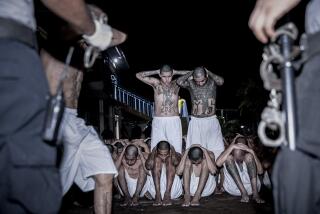FIRST PERSON : ASSASSINATION IN THE MIDDLE EAST : Tough, Sentimental--Rabin Personified Israel
Chain-smoking, unsmiling, hard-drinking, sentimental, blunt to the point of crudity--Yitzhak Rabin was the quintessential Israeli.
From my first encounter with him in 1984, when he was serving as minister of defense in Israel’s government of national unity and I was the newly appointed Middle East bureau chief of the Christian Science Monitor, I found Rabin the most fascinating of Israel’s political leaders.
I watched the tough-skinned soldier as he made the painful adjustment in his beliefs, from fighting a bloody war with the Palestine Liberation Organization to making peace with it. The same man who vowed, after the Palestinian uprising in the West Bank erupted in 1987, to “break the bones” of Palestinian demonstrators eventually engaged in lengthy tete-a-tetes with PLO Chairman Yasser Arafat on how to solidify the peace between their two peoples.
Israelis loved him because he seemed so much like them. He was the embodiment of the sabra, the native-born Israeli, inarticulate about his emotions, sarcastic and cutting, quick to anger but intensely loyal, a man who preferred taking action to theorizing.
In sharp contrast to his lifelong political rival, Foreign Minister Shimon Peres, Rabin never bothered to be charming or cared about being erudite. While Peres has always strived to surround himself with intellectuals, artists and authors, Rabin felt most comfortable in the company of soldiers.
“The difference between Rabin and Peres,” Uri Avneri, a left-wing politician who has known both men for 50 years, once told me, “can be seen clearly when you encounter them at parties. Peres will pull you aside and gossip brilliantly about everyone. He is both vicious and acute. Rabin, even after he’s had a few drinks, will still talk to you about strategy. He has no interest in personalities.”
Peres can at times be playful, even flirtatious. With Rabin, it was all business. Through his close adviser, Eitan Haber, I arranged to “interview” Rabin several times during the three years I worked for the Monitor. Each time, the routine was the same: I would be ushered into his office at the Defense Ministry headquarters in Tel Aviv and would spend the next hour or so listening to him give a strategic overview of the Middle East. It was hard to get in a question.
Smoking incessantly, hunched over and always tense, Rabin would survey Israel’s geostrategic situation and offer biting comments on its many enemies. Coming away from those encounters, I always felt that I had been sitting with a living history book.
From his days as a soldier in the Palmach, the Jewish underground that fought the British to bring an end to Britain’s U.N. mandate in Palestine, until the night he died, Rabin devoted his life to securing Israel and played a role in almost every significant military or diplomatic challenge the state encountered.
His weathered face, his watery blue eyes, his thinning hair--all were testimony to a life spent on the front lines.
Rabin often appeared confident to the point of arrogance, and he frequently infuriated his political opponents by dismissing them with scathing off-the-cuff remarks. Especially after he had decided to abandon his long-held belief that it was impossible for Israel to negotiate with the PLO, Rabin sparred verbally with settlers and others who accused him of betraying the Jewish state.
“If that is a settlement, then I am a kugelager ,” Rabin said acidly about a tiny settlement in the Gaza Strip, after Israel pulled out of most of Gaza in 1994 but kept soldiers behind to guard the handful of settlements there. Kugelager is a term that soldiers used in pre-state days for a ball bearing.
On more than one occasion, Rabin spoke harshly of the Jewish settlers in the Golan Heights who opposed his willingness to consider trading most or all of the strategic plateau for peace with Syria. Although many of the Golan settlers voted for the Labor Party in the last parliamentary elections and considered themselves Rabin supporters, he said that they could “turn in the wind like windmills” for all he cared.
He had no patience for those of his onetime followers who could not share his belief that Israel’s strategic interest lay in pursuing peace through territorial compromise with the Palestinians and the Syrians.
But neither did he mince words when he spoke of the Palestinians. He once remarked that he wouldn’t mind if Gaza simply sank into the Mediterranean Sea. He made no bones about the acute discomfort he felt around Arafat, an almost physical revulsion that stood in marked contrast to his approach to Jordan’s King Hussein.
Rabin’s public encounters with Hussein always charmed the Israeli public, because they gave him a glimpse of a side of the prime minister they almost never saw. Invariably, at treaty signing ceremonies and other events where the two leaders were thrown together, cameras would catch Rabin smiling, even laughing, and looking positively relaxed whenever he shared a podium with the king.
Hussein spoke of their special relationship in a telephone interview Saturday night with CNN.
“He was always a man of his word,” Hussein said. “He was a dear friend. We got along extremely well. Our relationship was one of mutual respect for each other. . . . Just a few days ago, we were working on a new beginning in terms of economic development and prosperity in this region. I really mourn a friend.”
More to Read
Sign up for Essential California
The most important California stories and recommendations in your inbox every morning.
You may occasionally receive promotional content from the Los Angeles Times.






